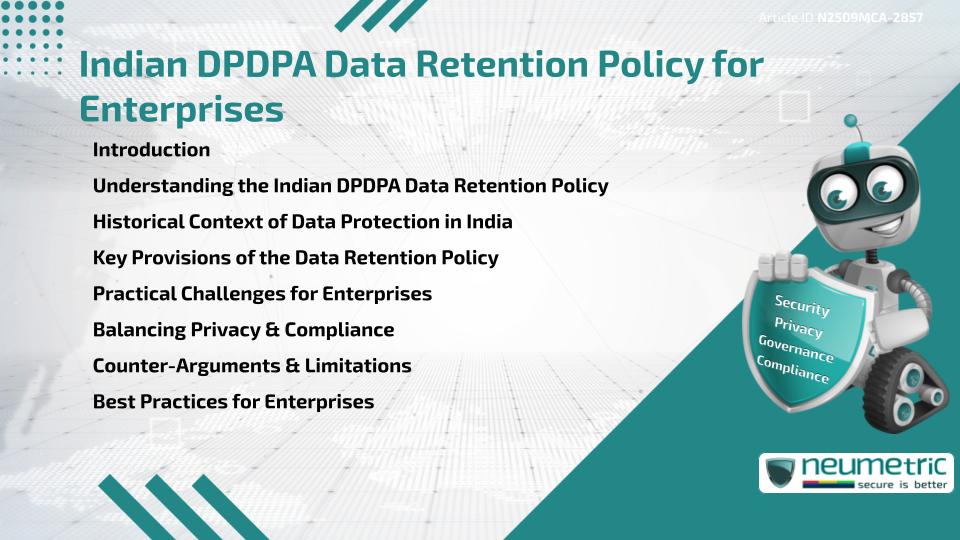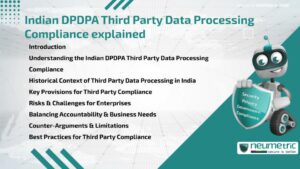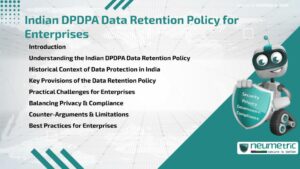Table of Contents
ToggleIntroduction
The Indian DPDPA Data Retention Policy establishes clear rules on how Enterprises should collect, store & dispose of Personal Data. Its goal is to balance Individual Privacy with organizational Compliance obligations. Under the Digital Personal Data Protection Act [DPDPA], Enterprises must ensure that Personal Data is retained only as long as necessary for lawful purposes & securely deleted when no longer required. This article explains the Background, Core Provisions, Challenges & Best Practices associated with the Indian DPDPA Data Retention Policy.
Understanding the Indian DPDPA Data Retention Policy
The Indian DPDPA Data Retention Policy is a Framework designed to regulate how Enterprises manage Personal Data throughout its Lifecycle. Enterprises must follow Principles of necessity & proportionality, meaning Data should not be kept indefinitely but only for a period linked to its intended use.
Historical Context of Data Protection in India
India lacked a Comprehensive Data Protection Law for many years, relying mainly on the Information Technology Act, 2000. With rising concerns over Data Misuse & International Privacy Standards such as the European Union’s General Data Protection Regulation [GDPR], the DPDPA was enacted to create a more structured Framework for Data Retention & Privacy.
Key Provisions of the Data Retention Policy
Enterprises must:
- Define Retention timelines for every Category of Personal Data.
- Erase Data securely once the purpose is fulfilled.
- Allow Data Principals to request Deletion of their Information.
- Demonstrate Accountability by documenting Retention Schedules.
These provisions aim to prevent indefinite storage, reduce Risks of breaches & ensure Compliance with Privacy rights.
Practical Challenges for Enterprises
Implementing the Indian DPDPA Data Retention Policy is not without hurdles. Enterprises often struggle with:
- Classifying diverse Categories of Data.
- Aligning Retention timelines with Industry-specific Regulations.
- Ensuring cost-effective storage & Deletion mechanisms.
- Training Employees to comply with Retention Schedules.
Balancing Privacy & Compliance
While the Policy safeguards individual rights, Enterprises must also retain some Data for Legal or Contractual reasons. For example, Financial Institutions must preserve Transaction records for a minimum Statutory Period. The challenge lies in striking a balance between protecting Privacy & Meeting Compliance needs.
Counter-Arguments & Limitations
Some critics argue that the Indian DPDPA Data Retention Policy could create excessive Administrative burdens for smaller Enterprises. Others believe that the lack of precise Sector-specific timelines leaves room for interpretation, which could lead to inconsistent Compliance across Industries.
Best Practices for Enterprises
To manage Compliance effectively, Enterprises should:
- Establish clear Retention Schedules for different Data Types.
- Implement secure Deletion Tools to prevent Unauthorised Recovery.
- Use automation to monitor Retention Periods.
- Regularly Audit Practices to ensure alignment with the Law.
Conclusion
The Indian DPDPA Data Retention Policy is a Critical Component of India’s Privacy Framework. It compels Enterprises to manage Data responsibly, protect User rights & avoid unnecessary Risks from indefinite storage. By adopting Best Practices & Balancing Compliance with Operational needs, Enterprises can meet the requirements of this Policy effectively.
Takeaways
- The Indian DPDPA Data Retention Policy regulates How long Personal Data can be stored.
- It enforces Accountability, Deletion & Purpose-driven Retention.
- Enterprises must balance Privacy obligations with Legal Compliance.
- Practical implementation requires clear Policies, Audits & Secure Deletion.
FAQ
What is the Indian DPDPA Data Retention Policy?
It is a Framework that regulates how long Enterprises can retain Personal Data before securely erasing it.
Why is the Policy important for Enterprises?
It ensures Compliance with Privacy rights, reduces Risks of Data breaches & builds trust with Customers.
Does the Policy apply to all Types of Data?
Yes, it applies to all Personal Data, though Sector-specific laws may impose additional requirements.
How can Enterprises comply with the Retention Policy?
They should create defined schedules, use secure Deletion practices & maintain regular Audits.
What challenges do Enterprises face in implementing the Policy?
Enterprises often struggle with Data Classification, Compliance costs & balancing Privacy with Statutory Obligations.
Are there Penalties for Non-compliance?
Yes, Non-compliance with the DPDPA can lead to significant Financial Penalties & Reputational harm.
Can Data Principals request Deletion of their Data?
Yes, individuals have the right to request Deletion once the Data is no longer needed for its original purpose.
References
- Digital Personal Data Protection Act – Ministry of Electronics & Information Technology
- India’s Data Protection Law Overview – Internet Society
- General Data Protection Regulation – European Commission
- Data Retention & Privacy – Electronic Frontier Foundation
- Data Protection & Retention Principles – OECD
Need help for Security, Privacy, Governance & VAPT?
Neumetric provides organisations the necessary help to achieve their CyberSecurity, Compliance, Governance, Privacy, Certifications & Pentesting needs.
Organisations & Businesses, specifically those which provide SaaS & AI Solutions in the Fintech, BFSI & other regulated sectors, usually need a CyberSecurity Partner for meeting & maintaining the ongoing Security & Privacy needs & requirements of their Enterprise Clients & Privacy conscious Customers.
SOC 2, ISO 27001, ISO 42001, NIST, HIPAA, HECVAT, EU GDPR are some of the Frameworks that are served by Fusion – a SaaS, multimodular, multitenant, centralised, automated, CyberSecurity & Compliance Management system.
Neumetric also provides Expert Services for technical Security which covers VAPT for Web Applications, APIs, iOS & Android Mobile Apps, Security Testing for AWS & other Cloud Environments & Cloud Infrastructure & other similar scopes.
Reach out to us by Email or filling out the Contact Form…





